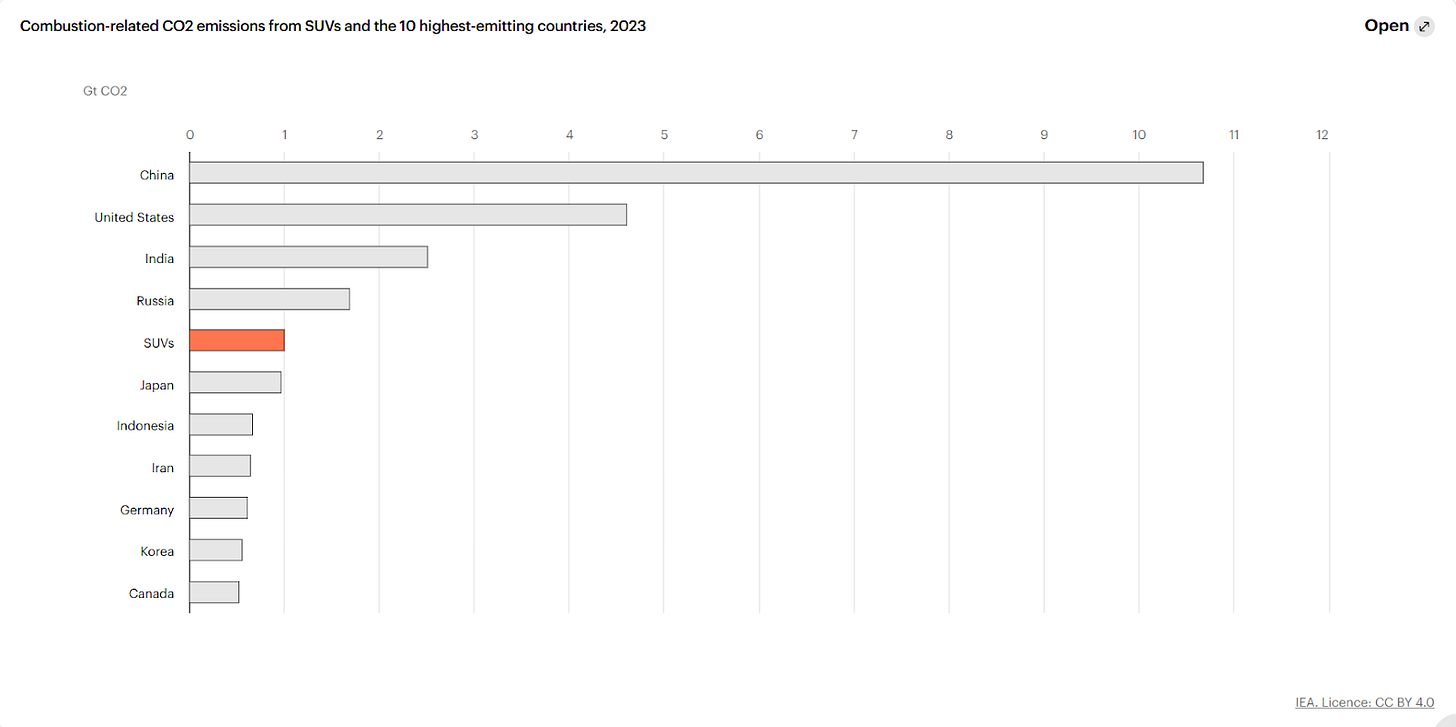The £2bn SUV tax giveaway, #180
Easy pickings
This week, the clamour to tax oversized vehicles gathers pace, while we celebrate women’s role in boosting cycling and road safety, we consider that not all traffic engineers deserve their reputation and we look back in time at the road that Londoners resisted.
BIG STORIES FOR CYCLING ADVOCACY
SUV TAX COULD RAISE £2BN. That’s the finding of research comparing the UK’s low tax rates for oversized SUVs with our European counterparts. A levy on the largest vehicles in the autumn budget would not only raise much-needed revenue but it would reflect the damage large SUVs inflict on people and infrastructure. Large vehicles cause excess wear and tear on the roads, pollute more and are more deadly when drivers hit other road users. Seems a good idea to me.
WOMEN LEADING THE WAY. The latest episode of Streets Ahead podcast is all about the importance of women’s leadership in people-friendly streets, the cycle industry and cycling more broadly. Recorded earlier this year by Laura Laker at the annual Velo-City conference, the episode contains some great insights into why women are a crucial part of the cycling landscape, the different perspectives and approaches they take, and why we need more leadership roles for females across the sector.
COME THE ERA, COME THE ENGINEER. They’ve a reputation for prioritising traffic volume and speed over all else but this piece, from an American traffic engineer of all people, argues change is happening. While many US cities are experiencing traffic fatality spikes, others are successfully curbing road danger. Measures like road diets, targeted safety improvements around school corridors and tackling high-risk streets have also come from traffic engineers. Times are changing, and some professionals are changing with it - they just need the political leadership to make it happen.
LONDON CARGO BIKE USE DOUBLES. Between 2022 and 2024 cargo bikes have doubled in number on London’s streets, according to analysis by Clean Cities. With recent analysis by the same group revealing diesel vans are the single biggest road source of NOx emissions, the strain taken up by pedal power is significant. However, there’s still a long way to go, and slower uptake of cargo cycles in the last year underlines the need for incentives to help more people access the vehicles, whose initial cost is still relatively high (though not as high as a family car or van).
GUESS WHO’S BACK?
Lillian Greenwood MP, that’s who. They say a week is a long time in politics; much-liked Minister Lillian Greenwood left the Department for Transport’s Ministerial team during Keir Starmer’s reshuffle on 5th September. But, this week, the department announced she’s back with the Local Transport brief (that’s buses, and historically, it’s included active travel too). She’ll also have the role as a Government whip. It’s a rather strange sequence of events, but I’m pleased there’s a very knowledgeable Minister back with a transport brief.
OTHER HEADLINES
THE ROADS LONDONERS TURNED AGAINST. It’s easy to forget that people haven’t always accepted road building as a Good Thing. In fact, in post-WWII London plans for a series of circular motorways that would have torn through Covent Garden, Camden Town and Islington rallied a conservation movement against it. Residents marched to protect their communities just as the city was rebuilding from the Blitz - and prevented the destruction of swathes of the city. This fascinating interview snippet looks back on that time.
INTERESTING GRAPH OF THE WEEK:
If SUVs were a country they would sit between the nations of Russia and Japan in combustion-related CO2 emissions. Source: https://www.iea.org/commentaries/suvs-are-setting-new-sales-records-each-year-and-so-are-their-emissions
ACTIVE TRAVEL WORD OF THE WEEK:
Lifetime carbon emissions. The total emissions from a product, like a car, including manufacturing, transport of the vehicle or its parts, fuel consumption during its lifetime and its disposal at end of life.
Until next time,
Adam
Adam Tranter
CEO, Fusion & Founder, #BikeIsBest
This newsletter is brought to you by Fusion, the agency for movers, specialising in communications and public affairs for active travel and mobility.







The proposal to redevelop Covent Garden, indeed a totem of the pre-conservation era of comprehemsive development, was entirely unrelated to the planned ring motoways around the inner, middle and outer areas of London. The interview clip wrongly suggests that they were related; but the only link between the plans was that they were roughly contemporary.